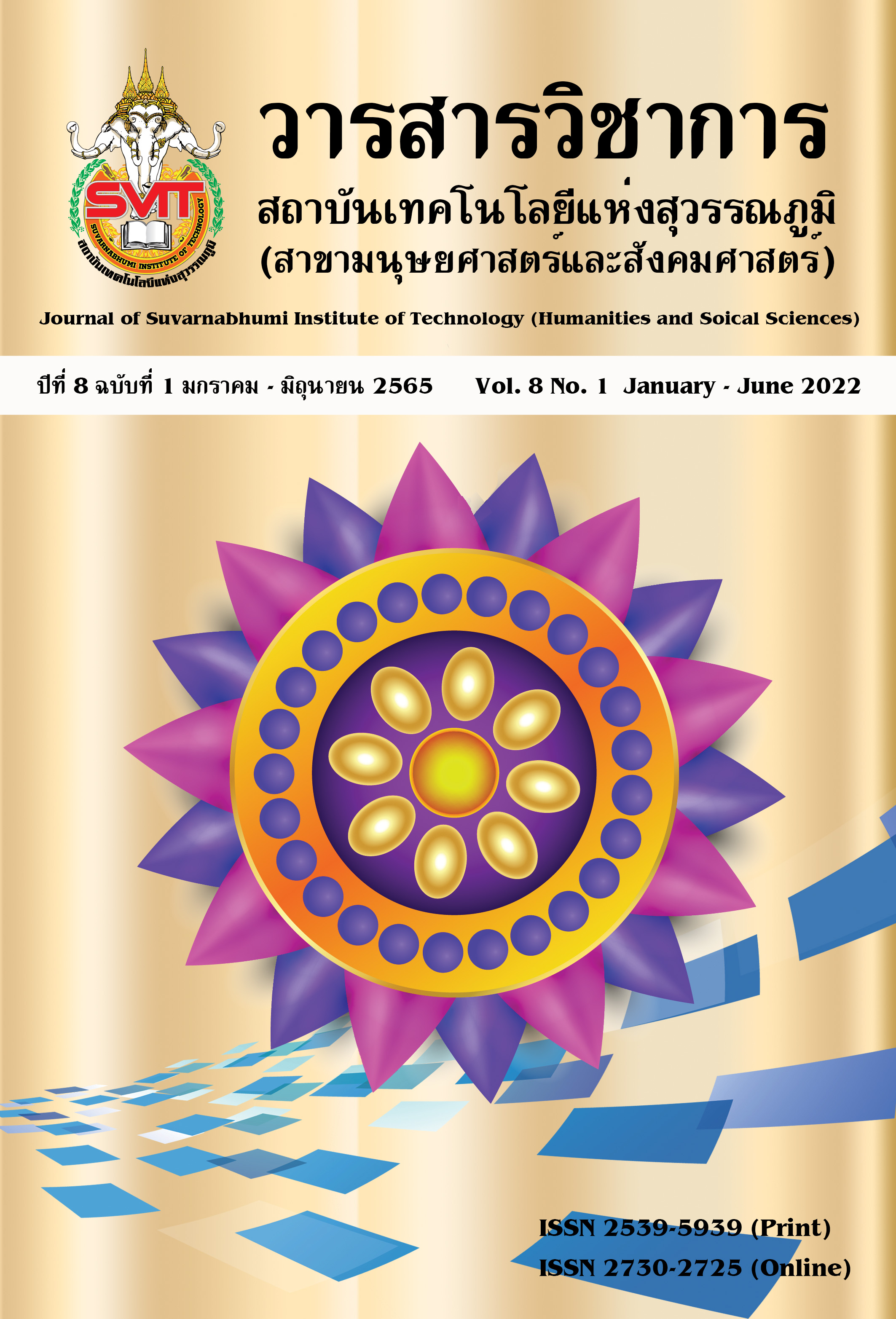THE DEVELOPMENT OF ADOLESCENT STUDENTS’ ANGER MANAGEMENT THROUGH ASSIMILATIVE INTEGRATIVE GROUP COUNSELING BASED ON RATIONAL EMOTIVE BEHAVIOR THEORY
Keywords:
assimilative integrated counseling, anger management, adolescent studentsAbstract
This research aimed to: 1) Study the elements of anger management of adolescent students. 2) Study the effects of integrative group counseling and technique based on rational emotive behavior theory which affected to anger management of adolescent students. The sample used in this study was adolescent students, aged between 18-20 years and studying in Rajamangala University of Technology, located in the central region, divided into 2 steps: Step 1: study the elements of anger management of adolescent students. The sample group used in the study was 1,000 adolescent students. Step 2: study the effects of integrative group counseling and technique based on rational emotive behavior theory which affected to anger management of adolescent students. The sample group was 20 students of Rajamangala university of Technology Phra Nakhon, randomly divided into experimental groups and control groups, 10 each, experimental group was conducting for 12 sessions, 90 minutes each, by using rational emotive behavior theory to improve their anger management. The control group simply continued their lives as normal. The tools used in this research were: 1) anger management measure developed by the researcher, with the reliability of the model measured by the alpha coefficient was equal to 0.84. 2) Integrative group counseling and technique based on rational emotive behavior theory toward anger management of adolescent students. Research results can be summarized as follows:
- The element of anger management of adolescent students revealed 4 factors consisted of: escalating strategies, negative attributions, self-awareness, and calming strategies. All factors were consistent with empirical data with a high component significantly at the level of .05
- The effects of integrative group counseling and technique based on rational emotive behavior theory which affected to anger management of adolescent students. The results revealed that.
2.1 Anger management of adolescent students in the experimental group after attending the integrated group counseling and follow-up sessions was significantly higher than the control group at the level of .05
2.2 Anger management of adolescent students in the experimental group after attending the integrated group counseling and follow-up sessions was significantly higher than pre-test at the level of .05
References
ดวงใจ ปินตามูล. (2557). การบริหารจัดการความโกรธ. กรุงเทพมหานคร: มหาจุฬาลงกรณราชวิทยาลัย.
ผ่องพรรณ เกิดพิทักษ์. (2551). แนวคิดและแนวปฏิบัติในการให้การปรึกษาแบบผสมผสานในประมวลสาระชุดวิชา ทฤษฎีและแนวปฏิบัติในการให้การปรึกษา หน่วยที่ 12 (พิมพ์ครั้งที่ 3). นนทบุรี: มหาวิทยาลัยสุโขทัยธรรมาธิราช.
เพ็ญนภา กุลนภาดล. (2560). การให้การปรึกษาวัยรุ่น (พิมพ์ครั้งที่ 2). กรุงเทพฯ: ประยูรสาส์นไทย การพิมพ์.
นพมาศ อุ้งพระ (ธีเวคิน). (2551). ทฤษฎีบุคลิกภาพและการปรับตัว (พิมพ์ครั้งที่ 4). กรุงเทพฯ: มหาวิทยาลัยธรรมศาสตร์.
ศรีเรือน แก้วกังวาน. (2554). ทฤษฎีจิตวิทยาบุคลิกภาพ (พิมพ์ครั้งที่ 16). กรุงเทพฯ: หมอชาวบ้าน.
Alireza M., et al. (2012). The effect of training self-awareness and anger management on aggression level in Iranian middle school students. Iran: University of social welfare and rehabilitation siences.
Corey, G. (2004). Theory and Practice of Group Counseling (6th ed.). CA: Thomson Brook/Cole, Cengage Learning.
Corey, G. (2008). Theory and Practice of Group Counseling (7th ed.) CA: Thomson Brooks/Cole, Cengage Learning.
Corey. (2004). A Gestalt Therapy Application to the Practice of Group Leadership
Corey G. (2012). Theory and Practice of Group Counseling (8th ed.). CA: Thomson Brooks/Cole, Cengage Learning.
Feldman, R. S. (2009). Understanding Psychology (9th ed). New York: United State.
Gazda, G. M. (1989). Group Counseling: A Development Approach (4th ed.) Boston: Houghton Mifflin
Hansen, J.C, et al. (1980). Group Counseling: Theory and Process (2nd ed.). Boston: Houghton Mifflin.
Jeffrey, R. K. (2007). Mindfulness-based and Cognitive-behavior Therapy for Anger management: an Integrated Approach. Philadelphia College of Osteopathic Medicine
Kassinove, H. (n.d.). How to recognize and deal with anger. Retrieved October 4, 2017, from http://www.apa.org/helpcenter/recognize-anger.aspx
Maslow, A. H. (1970). Motivation and personality (2nd ed.). New York: Harper.
Mills, H. (2015). Psychology of Anger. Retrieved October 4, 2017, from https://www.mentalhelp. net/articles/psychology-of-anger/
Nichols, M. P., & Schwartz, R. C. (2007). The essentials of family therapy (3th ed.). Boston:Pearson Eduucation.
Norcross, J. C., & Beutler, L. E. (2008). Integrative psychotherapies. Current psychotherapies, 481-511.
Sell Skiba . (2013). Anger management. IN: Indiana University.
Shirin Valizadeha., et al. (2010). The effectiveness of anger management skills training on reduction of aggression in adolescents. Islamic Azad University, Iran
Ulku, T. (2014). Anger Management of Students for a Peaceful School Environment:The Group Studies. Fatih University, Faculty of Education, Istanbul,Turkey
Feldman, R. S. (2009). Understanding Psychology (9th ed). New York: United State.
WHO. (2017). ความหมายวัยรุ่น. สืบค้น 15 ธันวาคม 2560, จาก http://www.who.int/maternal_ child _adolescent/topics/adolescence/dev/en/
Downloads
Published
Issue
Section
License
Copyright (c) 2022 Suvarnabhumi Institute of Technology

This work is licensed under a Creative Commons Attribution-NonCommercial-NoDerivatives 4.0 International License.
The articles published are copyrighted by the Sarasas Journal of Humanities and Social Science. The opinions expressed in each article in this academic journal are those of the individual authors and do not reflect the views of Sarasas Suvarnabhumi Institute of Technology. The authors are solely responsible for all aspects of their respective articles. Any errors or inaccuracies in the articles are the sole responsibility of the authors.



